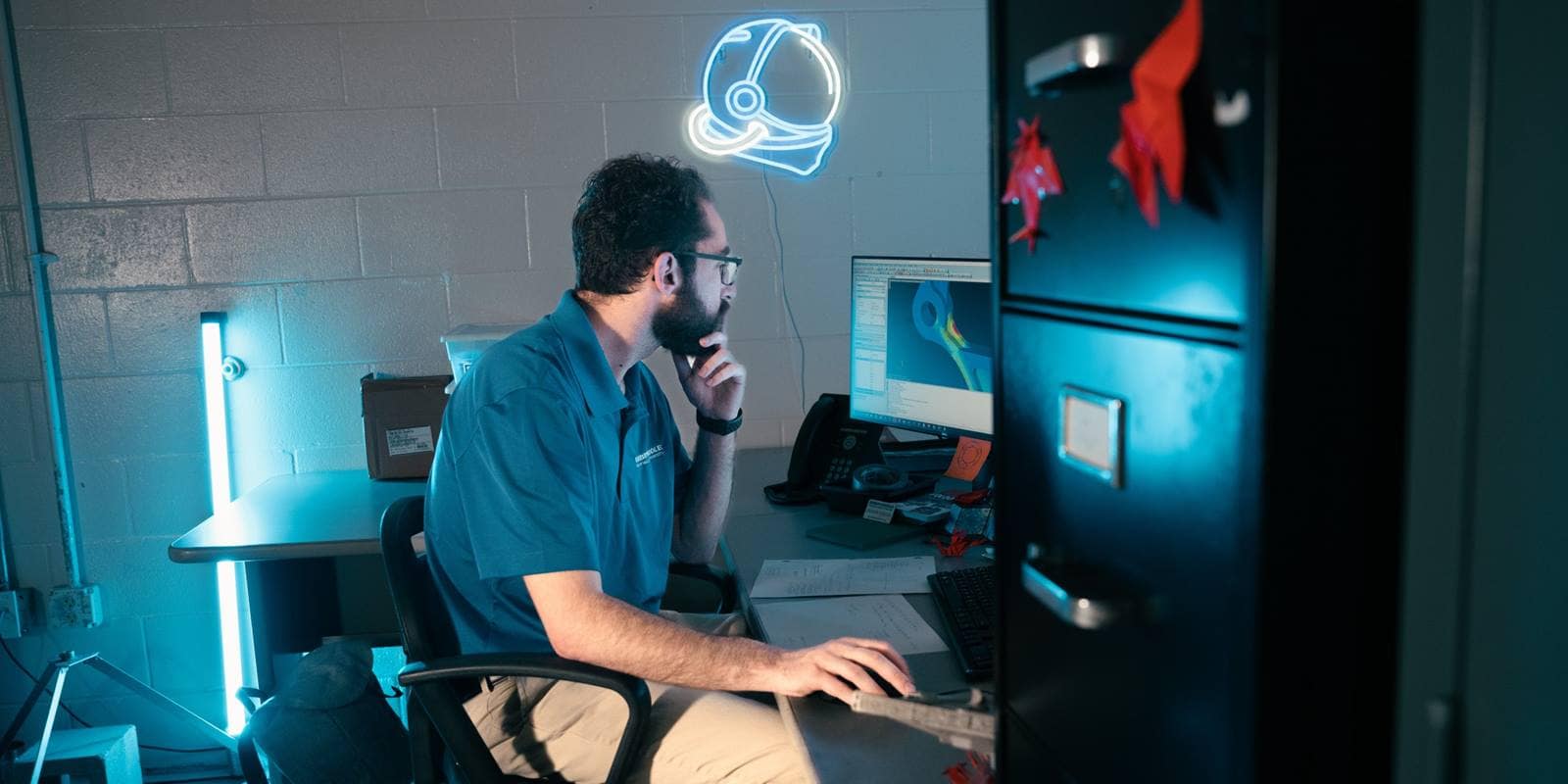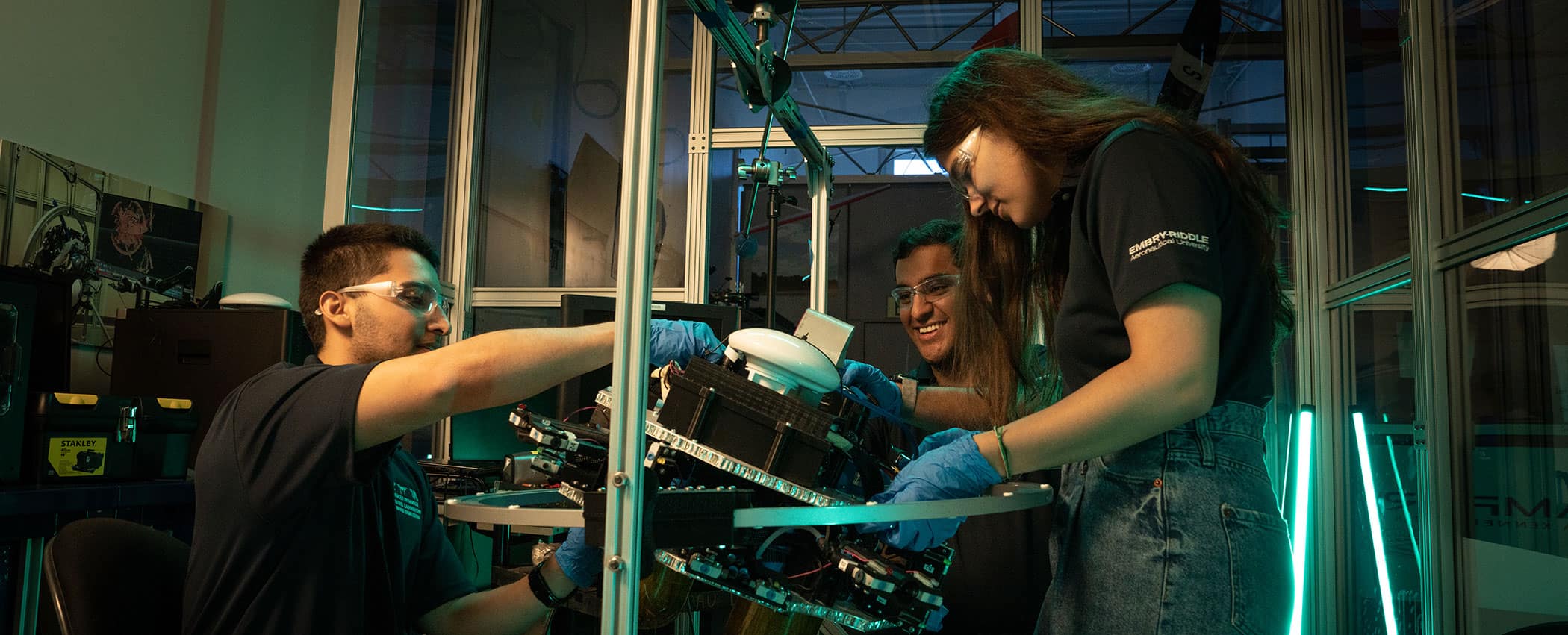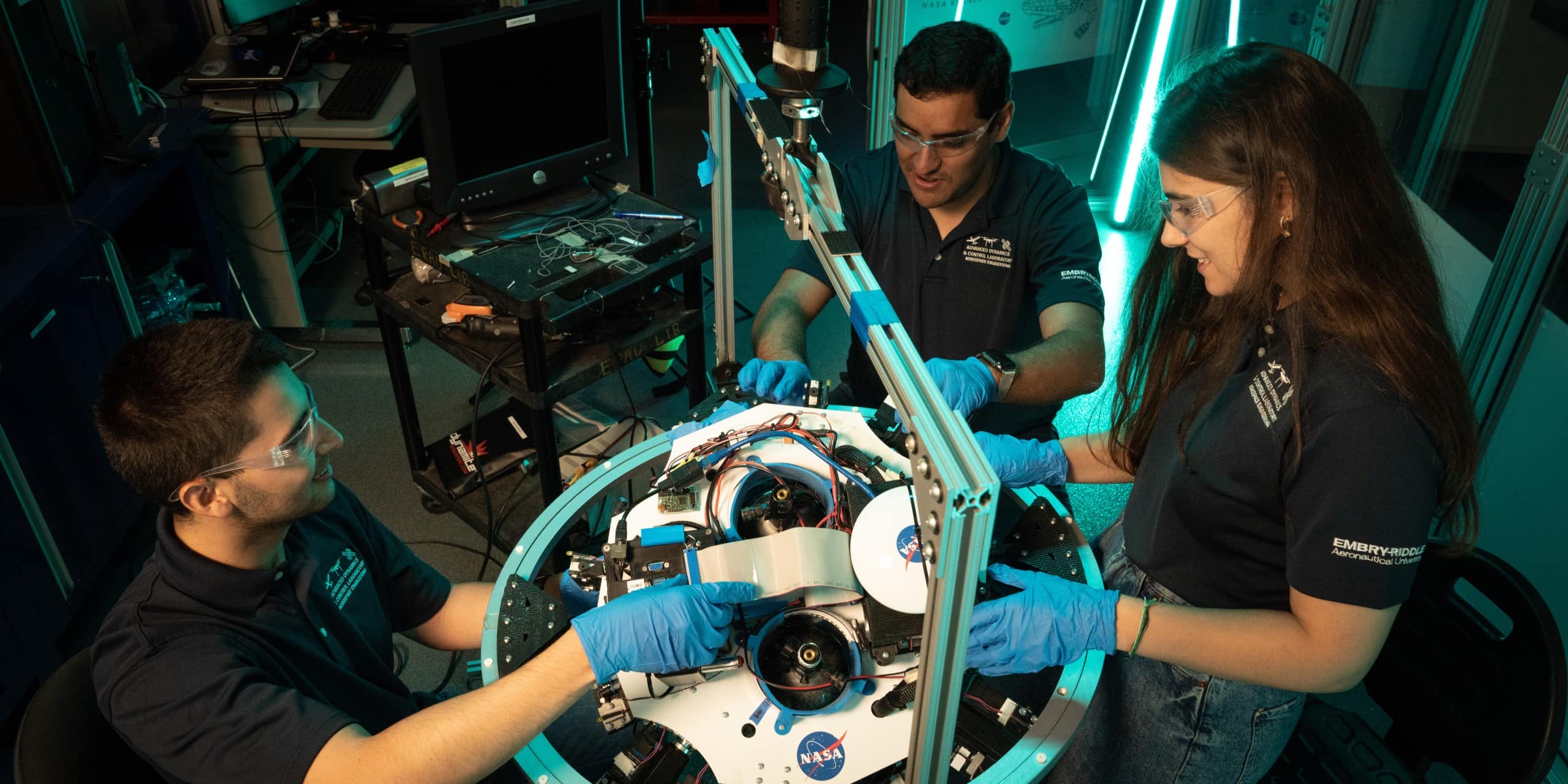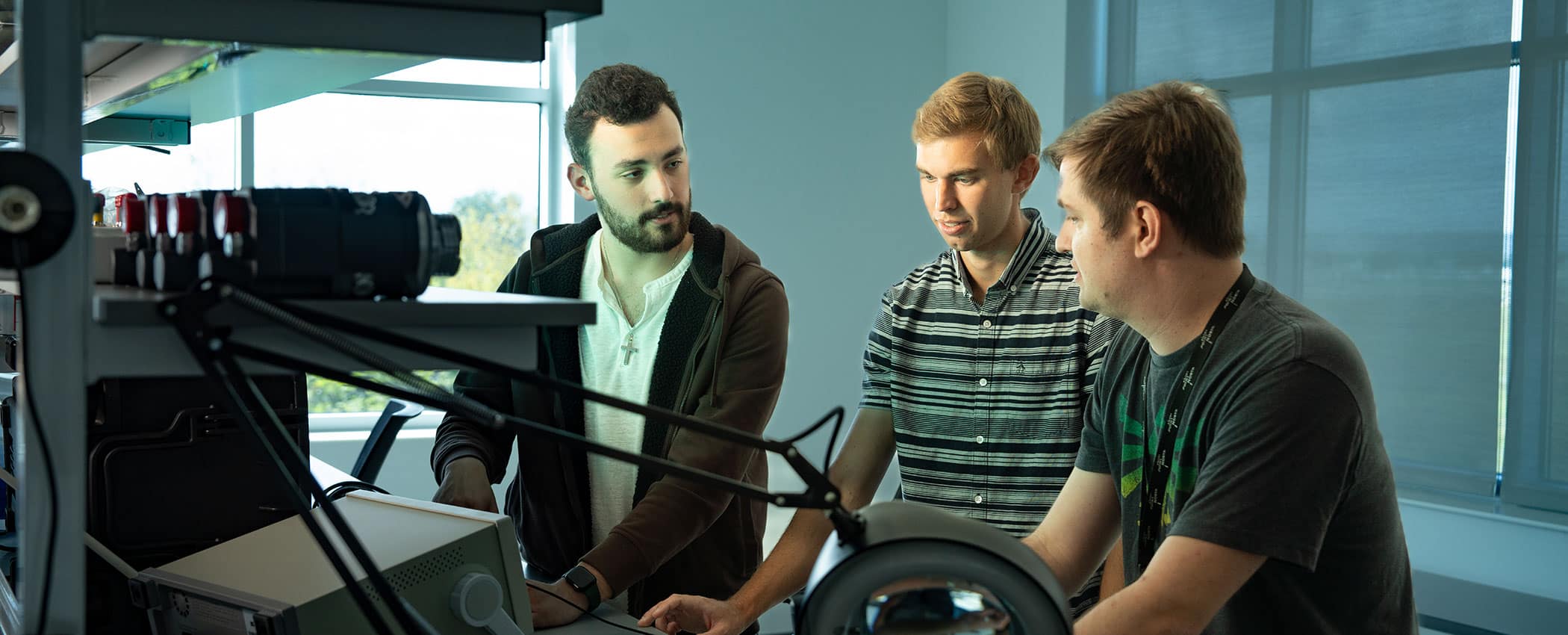
Bachelor of Science in
Engineering Technology
The Bachelor of Science in Engineering Technology allows students to research and use virtual labs to ensure they have the skills needed to excel in engineering.
About the Bachelor of Science in Engineering Technology
The Bachelor of Science in Engineering Technology program at Embry‑Riddle Aeronautical University leaves its graduates with deeper problem-solving skills, design techniques and engineering judgment, as well as fundamental industry knowledge and research experience. Program faculty members have extensive backgrounds in engineering, technology and related disciplines, and non-technical core courses are taught by subject matter experts in their corresponding disciplines.
Offered entirely online, this convenient and flexible degree program will prepare students to put their engineering skills to work in a variety of industries. Research projects, virtual labs and a capstone course round out the curriculum, ensuring that students graduate with the fundamental skills they need to achieve their career aspirations.
Program Educational Objectives
- Demonstrate technical skills as practicing technologists through applying knowledge and discipline-specific tools
- Operate effectively in a diverse, collaborative environment, demonstrating their professionalism, teamwork and communication skills
- Demonstrate self-directed lifelong learning and the ability to undertake graduate studies related to technology
Student Learning Outcomes
What you will learn while studying in the engineering technology program:
- Apply knowledge, techniques, skills and modern tools of mathematics, science, engineering and technology to solve broadly defined engineering problems appropriate to the discipline
- Design system, components or processes meeting specified needs for broadly defined engineering problems appropriate to the discipline
- Apply written, oral and graphical communication in broadly defined technical and non-technical environments, and identify and use appropriate technical literature
- Conduct standard tests, measurements and experiments to analyze and interpret the results to improve processes
- Function effectively as a member as well as a leader on technical teams
Engineering Technology Career Opportunities
Careers and Employers
Setting the standard, Embry-Riddle graduates are set to enter the workforce in top companies, including the U.S. Air Force and the U.S. Army, with a placement rate of 100% within a year of graduation.
Graduates with an online engineering technology degree often secure roles in:
- Aerospace Engineering
- Electrical Engineering
- Mechanical Engineering
- Systems Engineering
Engineering Technology Salary Information
Embry-Riddle provides the opportunity for competitive salaries, with alumni averaging $138,000 annually one-year post graduation, as of 2022.
DETAILS
About Engineering Technology at the Worldwide & Online Campus
Offered entirely online, the Engineering Technology program prepares students to put their engineering skills to work in a variety of industries. This convenient, flexible degree program allows students to partake in research projects, virtual labs and a capstone course, ensuring that students graduate with the fundamental skills they need to achieve their career aspirations.
The Worldwide & Online Campus is especially suited for working students, those on the go or students who want to save a bit of money while still living at home.
Tracks/Specialties and/or Certificates
Students can customize their online engineering technology degree by choosing from these available concentrations:
- Aeronautical Science: 9 credit hours
- Aviation Safety: 9 credit hours
- Helicopter Operations and Safety: 9 credit hours
- Logistics Management: 9 credit hours
- Management Information Systems: 9 credit hours
- Occupational Safety and Health: 9 credit hours
- Project Management: 9 credit hours
- Security and Intelligence: 9 credit hours
- Uncrewed and Autonomous Systems: 9 credit hours
Professional Accreditation
The Bachelor of Science in Engineering Technology program is accredited by the Engineering Technology Accreditation Commission of ABET, www.abet.org, under the commission's General Criteria with no applicable program criteria.
Engineering Technology Information
- Credits: 122
- Online or In-Person: Fully online
Helpful Links
- Attend a Worldwide Virtual Info Session
- Discover the Department's Faculty
- Explore the Fields of Study: Engineering & Computers and Technology
- Find Related Clubs & Organizations
Student Learning Outcomes
Students will:
- Have an ability to apply knowledge, techniques, skills and modern tools of mathematics, science, engineering, and technology to solve broadly-defined engineering problems appropriate to the discipline.
- Have an ability to design systems, components, or processes meeting specified needs for broadly-defined engineering problems appropriate to the discipline.
- Have an ability to apply written, oral, and graphical communication in broadly-defined technical and non-technical environments; and an ability to identify and use appropriate technical literature.
- Have an ability to conduct standard tests, measurements, and experiments and to analyze and interpret the results to improve processes.
- Have an ability to function effectively as a member as well as a leader on technical teams.
DEGREE REQUIREMENTS
General Education
| General Education | ||
| Embry-Riddle courses in the general education categories of Communication Theory and Skills, and Humanities and Social Sciences may be chosen from those listed below, assuming prerequisites are met. Courses from other institutions are acceptable if they fall into these broad categories and are at the level specified. | ||
| Communication Theory and Skills | ||
| ENGL 123 | English Composition | 3 |
| English/Speech electives | 6 | |
| Mathematics | ||
| MATH 241 | Calculus and Analytical Geometry I | 4 |
| MATH 242 | Calculus and Analytical Geometry II | 4 |
| Computer Science / Information | ||
| ENGR 115 | Introduction to Computing for Engineers | 3 |
| Physical and Life Sciences | ||
| CHEM 110 | General Chemistry I | 3 |
| CHEM 110L | General Chemistry I Laboratory | 1 |
| PHYS 150 | Physics I for Engineers | 3 |
| PHYS 160 | Physics II for Engineers | 3 |
| Humanities | ||
| HUMN 330 | Values and Ethics | 3 |
| Humanities lower level elective | 3 | |
| Social Sciences | ||
| ECON 210 | Microeconomics | 3 |
| ECON 211 | Macroeconomics | 3 |
| General Electives | ||
| General Open Electives | 9 | |
| Total Credits | 51 | |
Core/Major
| Business | ||
| STAT 222 | Business Statistics | 3 |
| Total Credits | 3 | |
| Leadership and Management | ||
| MGMT 201 | Principles of Management | 3 |
| MGMT 203 | Management for Aeronautical Science | 3 |
| Total Credits | 6 | |
| Technical Core | ||
| ENGR 101 | Introduction to Engineering | 3 |
| ENGR 120 | Graphical Communications | 3 |
| ESCI 201 | Statics | 3 |
| CESC 220 | Digital Circuit Design | 3 |
| CESC 222 | Digital Circuit Design Laboratory | 1 |
| ESCI 204 | Dynamics | 3 |
| ESCI 202 | Solid Mechanics | 3 |
| ESCI 206 | Fluid Mechanics | 3 |
| RSCH 202 | Introduction to Research Methods | 3 |
| ETEC 310 | Material Science for Engineering Technology | 3 |
| ETEC 315 | Circuits for Engineering Technology | 3 |
| ETEC 316 | Circuits Laboratory for Engineering Technology | 1 |
| ETEC 410 | Thermodynamics for Engineering Technology | 3 |
| ETEC 415 | Control Systems | 3 |
| ETEC 490 | Engineering Technology Capstone I | 3 |
| ETEC 491 | Engineering Technology Capstone II | 3 |
| Total Credits | 44 | |
Electives/Concentration
| Concentrations | 18 | |
| Following concentration areas are available to BSET students. Students may choose at least 3 courses each from two concentration areas. | ||
| Total Degree Requirements | 122 | |
Concentrations:
Aeronautical Science
| Aeronautical Science Concentration | ||
| ASCI 309 | Aerodynamics | 3 |
| AMNT 429 | Advanced Technologies in Design and Production of Aircraft Structures and Systems | 3 |
| ETEC 409 | Applied Aeronautics | 3 |
Aviation Safety
| Aviation Safety Concentration | ||
| BSAS 320 | Human Factors in Aviation Safety | 3 |
| BSAS 330 | Aircraft Accident Investigation | 3 |
| BSAS 409 | Aviation Safety | 3 |
Helicopter Operations and Safety
| Helicopter Operations and Safety Concentration | ||
| ASCI 317 | Rotorcraft | 3 |
| ASCI 378 | Helicopter Flight Environments | 3 |
| ASCI 388 | Helicopter Flight Planning | 3 |
Uncrewed and Autonomous Systems
| Uncrewed and Autonomous Systems Concentration | ||
| UNSY 315 | Uncrewed Aircraft Systems and Operations | 3 |
| UNSY 318 | Uncrewed Aircraft Systems Robotics | 3 |
| UNSY 410 | Uncrewed Systems Sensing Technology | 3 |
Logistics Management
| Logistics Management Concentration | ||
| LGMT 331 | Transportation Principles | 3 |
| LGMT 410 | Management of Air Cargo | 3 |
| LGMT 411 | Logistics Management for Aviation/Aerospace | 3 |
Management Information Systems
| Management Information Systems Concentration | ||
| MMIS 320 | Business Information Systems | 3 |
| MMIS 392 | Database Management | 3 |
| MMIS 494 | Aviation Information Systems | 3 |
Occupational Safety & Health
| Occupational Safety & Health Concentration | ||
| SFTY 311 | Fundamentals of Occupational Safety and Health | 3 |
| SFTY 321 | Ergonomics | 3 |
| SFTY 355 | Industrial Hygiene and Toxicology | 3 |
Project Management
| Project Management Concentration | ||
| PMGT 391 | Project Planning 1 | 3 |
| PMGT 394 | Project Planning 2 | 3 |
| PMGT 400 | Project Risk and Control | 3 |
Security and Intelligence
| Security and Intelligence Concentration | ||
| SCTY 315 | Studies in Intelligence I | 3 |
| SCTY 385 | Intelligence Collection and Analysis | 3 |
| SCTY 488 | National Security Issues and Terrorism | 3 |
Plan of Study (BSET)
Year One
| Term 1 | Credits | |
|---|---|---|
| ENGR 101 | Introduction to Engineering | 3 |
| ENGL 123 | English Composition | 3 |
| Credits Subtotal | 6.0 | |
| Term 2 | ||
| MATH 241 | Calculus and Analytical Geometry I | 4 |
| ENGR 115 | Introduction to Computing for Engineers | 3 |
| Humanities Lower-Level (HUMN) | 3 | |
| Credits Subtotal | 10.0 | |
| Term 3 | ||
| MATH 242 | Calculus and Analytical Geometry II | 4 |
| PHYS 150 | Physics I for Engineers | 3 |
| Credits Subtotal | 7.0 | |
| Term 4 | ||
| PHYS 160 | Physics II for Engineers | 3 |
| English/Speech (ENGL/SPCH) | 3 | |
| ECON 210 | Microeconomics | 3 |
| Credits Subtotal | 9.0 | |
| Credits Total: | 32.0 | |
Year Two
| Term 1 | Credits | |
|---|---|---|
| ENGR 120 | Graphical Communications | 3 |
| CHEM 110 | General Chemistry I | 3 |
| CHEM 110L | General Chemistry I Laboratory | 1 |
| English/Speech (ENGL/SPCH) | 3 | |
| Credits Subtotal | 10.0 | |
| Term 2 | ||
| ESCI 201 | Statics | 3 |
| CESC 220 | Digital Circuit Design | 3 |
| CESC 222 | Digital Circuit Design Laboratory | 1 |
| Credits Subtotal | 7.0 | |
| Term 3 | ||
| ESCI 202 | Solid Mechanics | 3 |
| ESCI 206 | Fluid Mechanics | 3 |
| ECON 211 | Macroeconomics | 3 |
| Credits Subtotal | 9.0 | |
| Term 4 | ||
| ESCI 204 | Dynamics | 3 |
| STAT 222 | Business Statistics | 3 |
| Credits Subtotal | 6.0 | |
| Credits Total: | 32.0 | |
Year Three
| Term 1 | Credits | |
|---|---|---|
| ETEC 310 | Material Science for Engineering Technology | 3 |
| RSCH 202 | Introduction to Research Methods | 3 |
| Credits Subtotal | 6.0 | |
| Term 2 | ||
| HUMN 330 | Values and Ethics | 3 |
| MGMT 201 | Principles of Management | 3 |
| Area of Concentration course | 3 | |
| Credits Subtotal | 9.0 | |
| Term 3 | ||
| MGMT 203 | Management for Aeronautical Science | 3 |
| ETEC 315 | Circuits for Engineering Technology | 3 |
| ETEC 316 | Circuits Laboratory for Engineering Technology | 1 |
| Credits Subtotal | 7.0 | |
| Term 4 | ||
| Area of Concentration course | 3 | |
| Open Elective (General) | 3 | |
| Area of Concentration course | 3 | |
| Credits Subtotal | 9.0 | |
| Credits Total: | 31.0 | |
Year Four
| Term 1 | Credits | |
|---|---|---|
| Area of Concentration course | 3 | |
| Area of Concentration course | 3 | |
| Open Elective (General) | 3 | |
| Credits Subtotal | 9.0 | |
| Term 2 | ||
| ETEC 410 | Thermodynamics for Engineering Technology | 3 |
| ETEC 415 | Control Systems | 3 |
| Credits Subtotal | 6.0 | |
| Term 3 | ||
| Area of Concentration course | 3 | |
| ETEC 490 | Engineering Technology Capstone I | 3 |
| Credits Subtotal | 6.0 | |
| Term 4 | ||
| ETEC 491 | Engineering Technology Capstone II | 3 |
| Open Elective (General) | 3 | |
| Credits Subtotal | 6.0 | |
| Credits Total: | 27.0 | |
| Total Degree Requirements | 122 | |
Get Started Now:
Summary
122 Credits
Estimate your tuition by using the Tuition Calculator
View Financial Aid Information
Learn more about the benefits of an Online Degree
Learn about our General Education
Find out about transferring credits to this degree
Learn more about our Veterans & Military benefits
View our Academic Calendar
Search Courses for this degree




